Lucene Best Practices
Explore supports an enhanced version of Lucene, offering autocomplete suggestions and syntax highlighting to help you build faster, more accurate queries.
As you type, Lucene displays available fields, variables, and operators. If your query contains a syntax error, hover over the error indicator to get feedback and fix it easily.
Basic queries
Search for any logs that contain a specific word:
error

Search by specific fields and values using Lucene's auto complete feature. As you type, Lucene generates the relevant fields and values:
object.status.capacity.pods:"29"
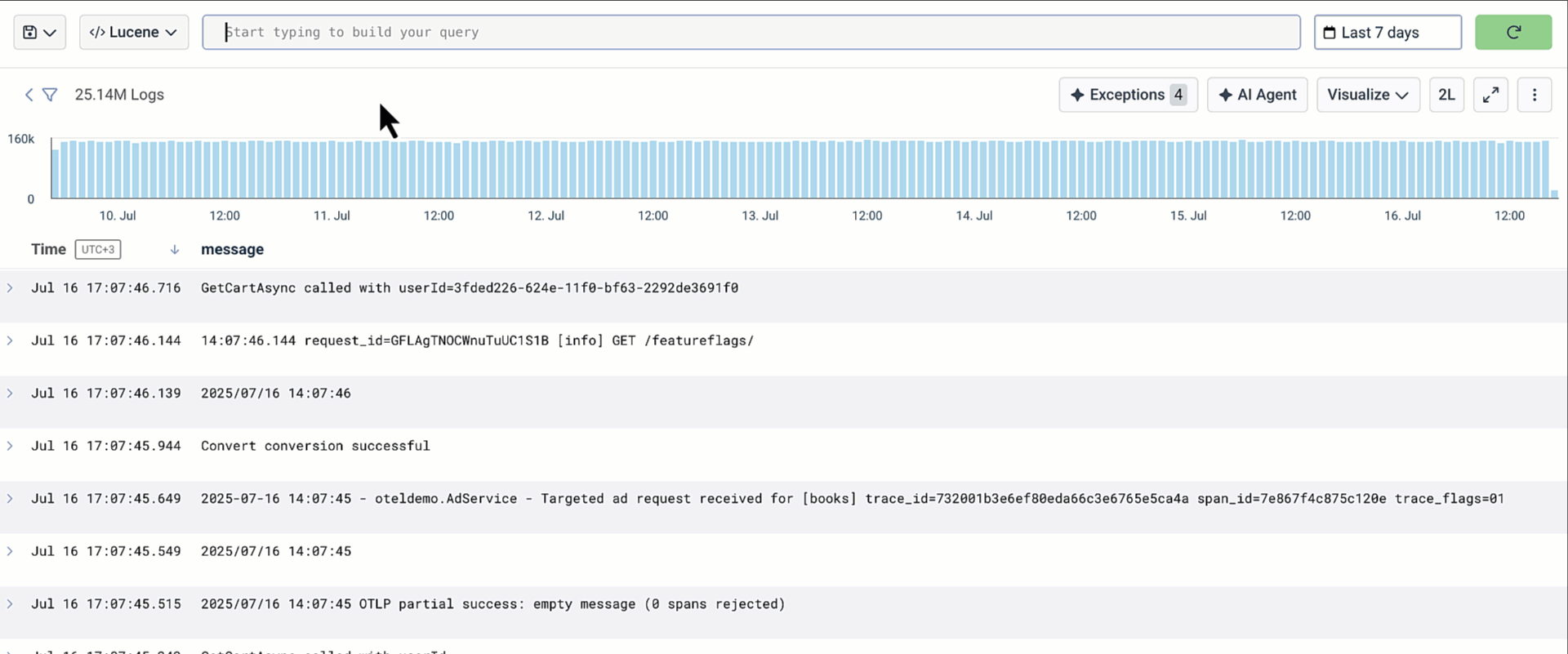
Use boolean operators to combine filters:
k8s_container_name:"kafka" AND level_str:"ERROR"
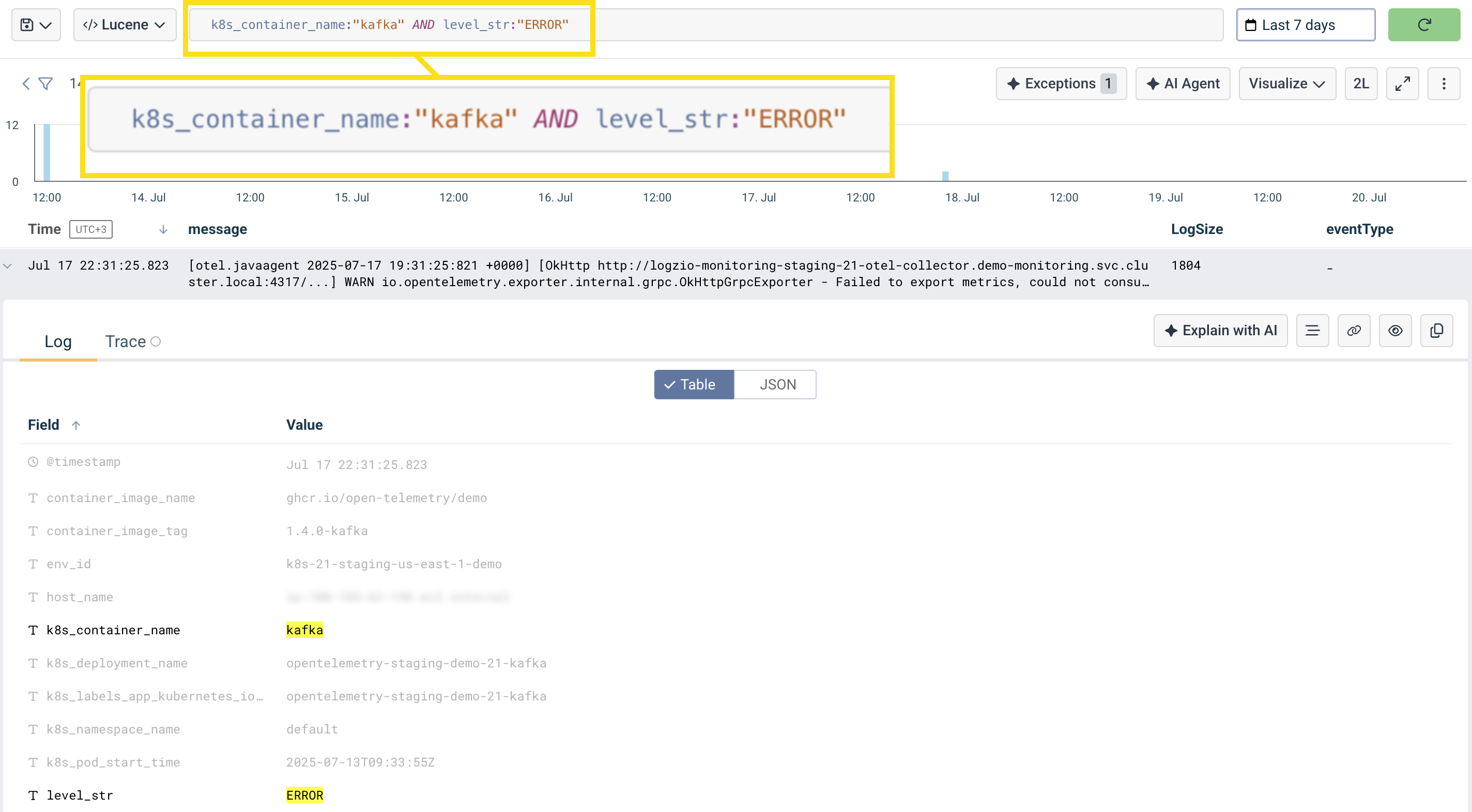
Use parentheses to group conditions:
k8s_container_name:"kafka" AND (level_str:"ERROR" OR level_str:"INFO")
Wildcards
Wildcards are special characters (* and ?) used in search queries to match one or more unknown characters in a word or value. These can’t be the first character in a term or field name.
Search using partial matches:
Single character:
k8s-19-demo-us-east-?-demo
This would match k8s-19-demo-us-east-1-demo, k8s-19-demo-us-east-2-demo, but not k8s-19-demo-us-east-12-demo because ? matches only one character.
Multiple characters:
k8s_container_name:aws-*
This matches values like aws-load-balancer-controller-leader, aws-node, aws-init, and any other that starts with aws-.
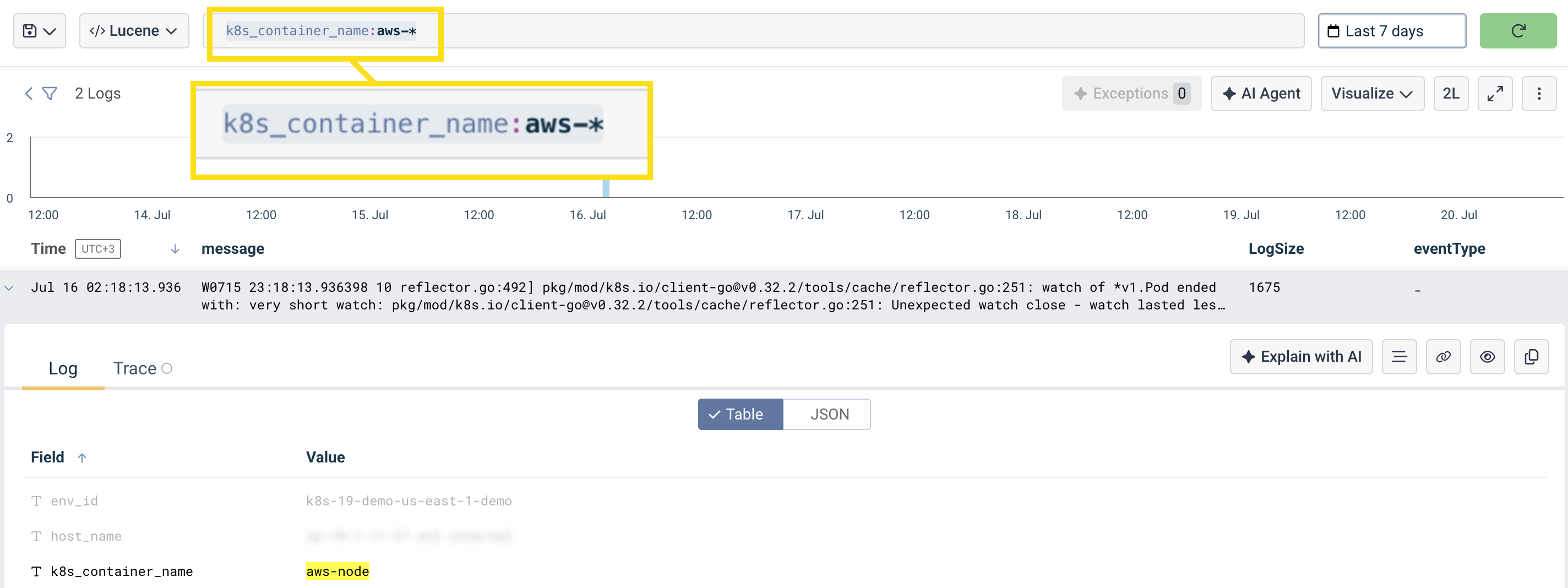
Range queries
To perform range-based searches, the field must be mapped as a numeric value (e.g., long, float, double).
Inclusive range:
bytes:[1000 TO 2000]
Exclusive range:
bytes:{1000 TO 2000}
Open-ended range:
timestamp:[2022-01-01 TO *]
Example:
Find logs where logSize is between 2000 and 3000:
logSize:[2000 TO 3000]
Add another filter:
logSize:[2000 TO 3000] AND eventType:MODIFIED
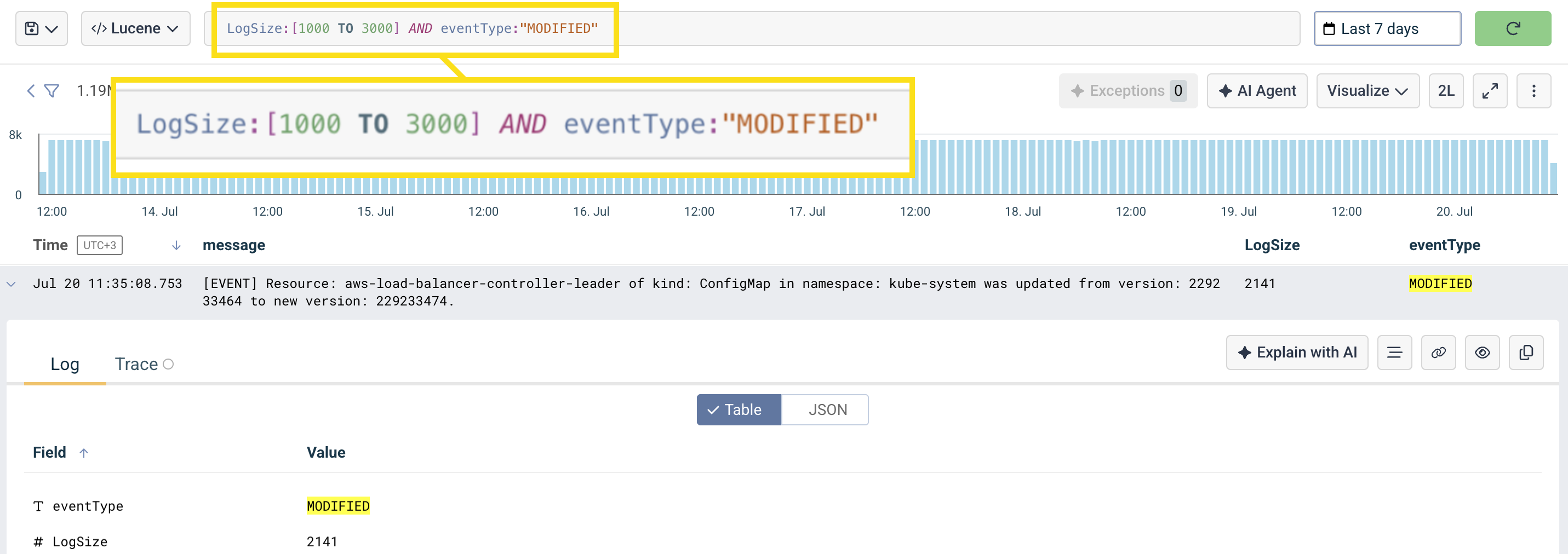
To exclude specific values:
LogSize:[1000 TO 3000] AND eventType NOT "MODIFIED"
Fuzzy matching
Fuzzy matching helps when you're not sure about the exact spelling or expect typos. Use the ~ operator:
env_id:k8s-20-demo-us-east-1-domo~
This will return logs where the env_id is similar to k8s-20-demo-us-east-1-domo, based on edit distance.
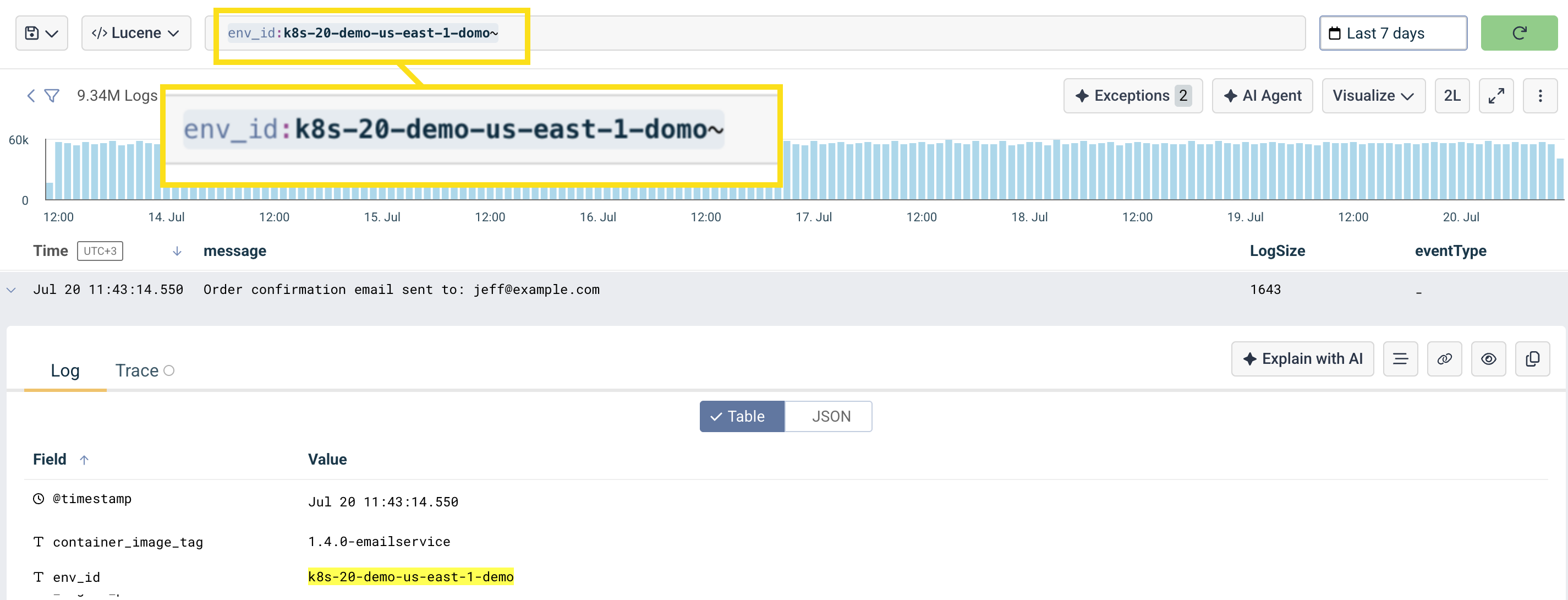
You can also set a similarity level (1 or 2):
env_id:k8s-20-demo-us-east-1-domo~1
Proximity matching
Use proximity search to find words that are near each other, even if not in exact order. To find logs where failed appears within 5 words of status, regardless of order:
"failed status"~5
This matches messages like:
GET /api/v1 failed due to unexpected status 500, or status code 500 was returned because the request failed.
It’s especially useful when logs contain variable wording or you want to capture related phrases even if they're not side-by-side.
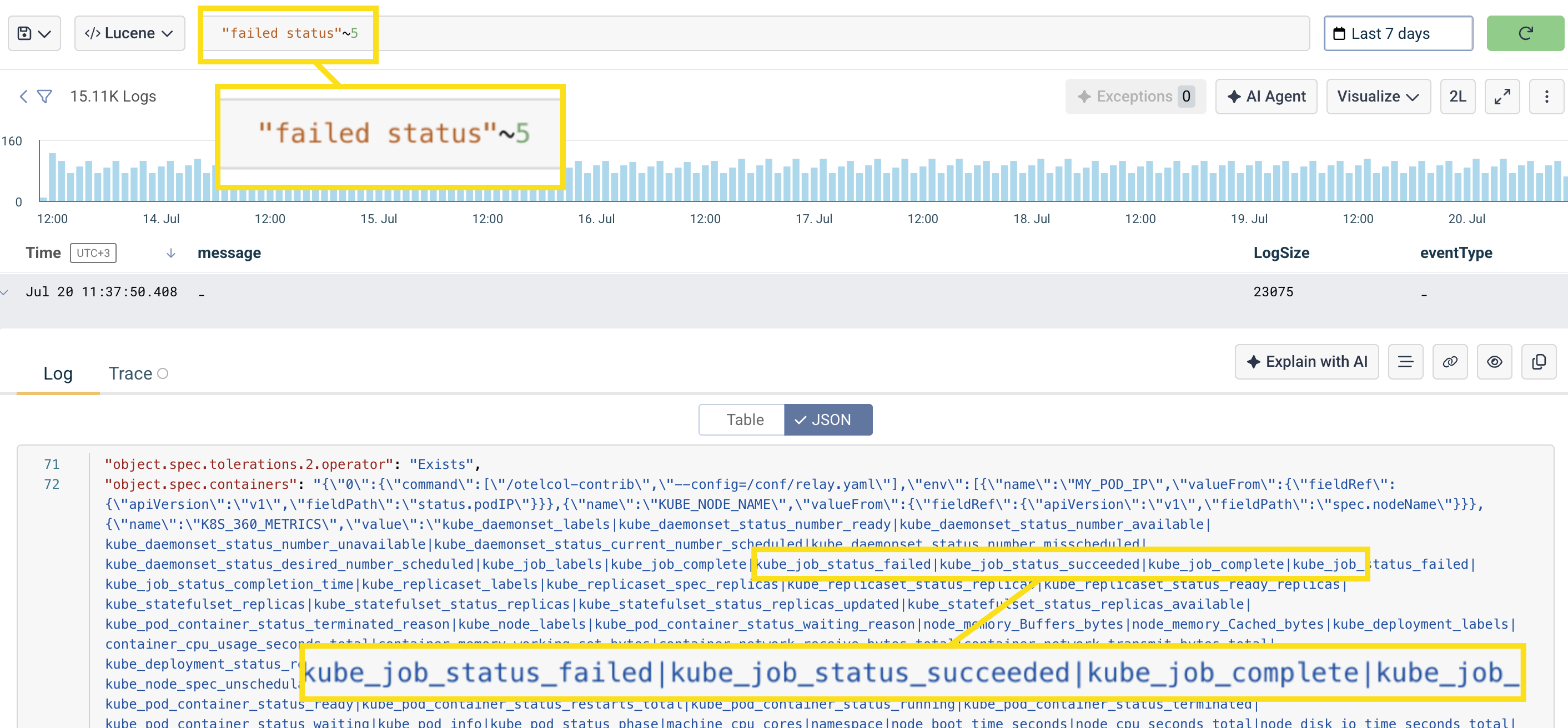
Field existence and null checks
Use _exists_ to find logs where a specific field is present:
_exists_:newObject.kind
Returns all logs that include the newObject.kind field, regardless of its value.
To find logs where a field doesn't exist, use the NOT operator:
NOT _exists_:newObject.kind
Returns logs where newObject.kind is missing.
You can also combine existence checks with other filters:
_exists_:newObject.kind AND newObject.metadata.name:"aws-lb-controller-tls"
Finds logs that have an newObject.kind and the metadata name of aws-lb-controller-tls.
Special characters and regex
Lucene treats some characters as special operators. If you want to search for them literally (like in a file path or error message), escape them with a backslash (\).
Common special characters:
+ - && || ! ( ) { } [ ] ^ " ~ * ? : \
To search using a regular expression, use the /regex/ format. This works well for partial matches, variations, or when field values include symbols.
Search for any logs where the newObject.metadata.name field ends in controller-leader:
newObject.metadata.name:/.*controller-leader/
If your search term contains special characters like /, ., or :, wrap the entire value in double quotes. This is especially useful when searching fields with slashes or dots in their names or values.
To search for the exact newObject.metadata.name value aws-load-balancer-controller-leader, use:
newObject.metadata.name:"aws-load-balancer-controller-leader"
Use with caution: regex queries can be resource-intensive and may be disabled on some systems.
Lucene does not support field names that include special characters like slashes (/), so queries like this won’t work: newObject.metadata.annotations.control_plane_alpha_kubernetes_io/leader:"control-plane.alpha.kubernetes.io/leader". To search for values in such fields, use a free-text search instead: "control-plane.alpha.kubernetes.io/leader".
Pro Tip
For complex filtering logic, use the Explore UI to build filters, then copy the generated Lucene query and fine-tune as needed.
Keyboard Shortcuts
Explore includes several keyboard shortcuts to help streamline your workflow:
- Control + Enter – Submits the query, even if the suggestion menu is open.
- Shift + Enter – Creates a new line to organize your Lucene query more clearly.
- Command + D – Highlights the next occurrence of the selected word.
Explore uses the same editor as VS Code, so most of its shortcuts will work here. View the full list here.
Looking for a shortcut that isn’t available? Let us know, and we’ll consider adding it!